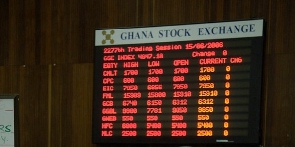Mechanical Llyod the indigenously owned vehicle and agricultural equipment dealer has become the latest company to delist from the Ghana Stock Exchange.
It follows the delisting of PZ Cussons during the last quarter of 2020. Both companies have been listed on the GSE since its early days during the early part of the 1990s.
Managers of the Ghana Stock Exchange are worried by the number of erstwhile listed companies that have gone private over the past half a decade. Since 2017, eight companies have had their listing on the Ghana Stock Exchange cancelled or suspended or have on their own initiated their delisting from the local bourse.
Mechanical Lloyd’s de-listing GSE became effective from 16th April, 2021. It follows an offer by the majority shareholder for everyone else’s shares. At the close of the offer, 165 shareholders tendered in a total of 2,800.065 ordinary shares. A settlement to all applicants was concluded by 8 April 2021 per the offer timetable.
This follows on last November’s delisting by PZ Cussons, also a pioneer listyed company on the GSE right from oits establishment in the early 1990s, although in its case it is a multinational rather than a majority indigenously owned corporation. It announced the company’s delisting from the GSE effective from October 19 2020.
The GSE approved the delisting of P Z Cussons from the stock market following a review of offer documents to initiate the process.
The offer results and delisting were subsequently approved by the GSE too. Out of a total of 2,079 shareholders represented in the register, 410 tendered a total of 8.8 million shares valued at over GHc3.9 million, representing 53.37% of the total number of shares under the offer. This allowed the company’s ownership to revert fully to Paterson Zochonis, the France-headquartered multinational.
According to P Z Cussons Ghana, the decision to delist was in line with the company’s plans to achieve operational efficiency by giving its management more time and resources to focus on running and expanding the business, its distribution network and its reach, thereby ensuring consumer satisfaction.
The two latest delistings, Mechanical Lloyd and PZ Cussons, were both voluntary as their owners seek to restructure their operations involving new capital reinjections which most other shareholders – especially retail investors and equity funds – would be unwilling to take part in especially at a time the GSE has been in the grip of its longest bear market in its three decade history. The GSE composite index has declined every year since 2018 generating negative returns for the shareholders of most listed companies. Their delistings follow a similar one by Accra Brewery, the Ghanaian subsidiary of South African Breweries about a decade ago.
However, some of the recent wave of delistings have been compulsory as the bourse’s management has moved to punish major infractions to its rules, particularly failure to comply with financial reporting requirements. Firms like Pioneer Kitchenware, African Champion Industries, Golden Web, Transaction Solutions Ghana and UT Bankunderwent compulsory elisting for such corporate governance and financial reporting infractions.
More recently Sam Woode, a publishing company, was suspended from being a listed company last year. Its ultimate fate is still uncertain.
The GSE’s management cracked the whip after being criticized for failing to take action against UT Bank for financial reporting infractions, until its industry regulator, the Bank of Ghana actually revoked its operating license for the reason of insolvency, leaving shareholders in the lurch.
However voluntary delisting seems to be becoming more and more popular as the stock market tries to cope with its longest bear market so far, which is accused of significantly undervaluing the companies listed and trading on it.
Speaking on the recent delistings from the local bourse, The Head of Research at Databank, Alex Boahen, has attributed the ongoing spat of delistings situation to a plethora of issues including the poor performance of the companies.
“The reason why investors invest in companies is that they want the companies to be profitable so that they can pay dividends to them.They want their share prices to actually appreciate on the market so that they can make capital gains when they sell their stock.
But if you look at it, recently these companies have actually failed to deliver both dividends and share price appreciation and it stands to treason that when it gets to a point, it is probably in the interest of the shareholder and investor community for these companies to actually go off the market so that they can leave the public spotlight and then they can re-strategize and when things actually improve, they can always come back and apply and list on the market again.”
For example, companies with institutional shareholders get tempted to delist when minority shareholders are reluctant to back major new investments that require rights issues at a time that dividends are not being paid or capital gains from share price appreciation are not being achieved.
While encouraging the about 30 companies still on the local bourse to strengthen their corporate governance systems as well as improve their operations in order to avoid being delisted, Alex Boahen also advised other businesses to consider listing on the Ghana Alternative Market, GAX, to avoid the strict compliance standards of the main market.
“I’ve always seen the call encouraging companies to list on the market as a brilliant idea. I think it needs to be pushed more so that at least we can get a lot more SMEs coming unto the market, especially the GAX. The rules on the GAX market is actually a bit more relaxed than on the main market because even in terms of financial reporting the GAX companies do their reporting twice in a year whiles on the main market, you report four times in a year. So, I will advise that some of these companies can repackage themselves and list on the GAX if possible.”
Business News of Monday, 19 April 2021
Source: goldstreetbusiness.com













